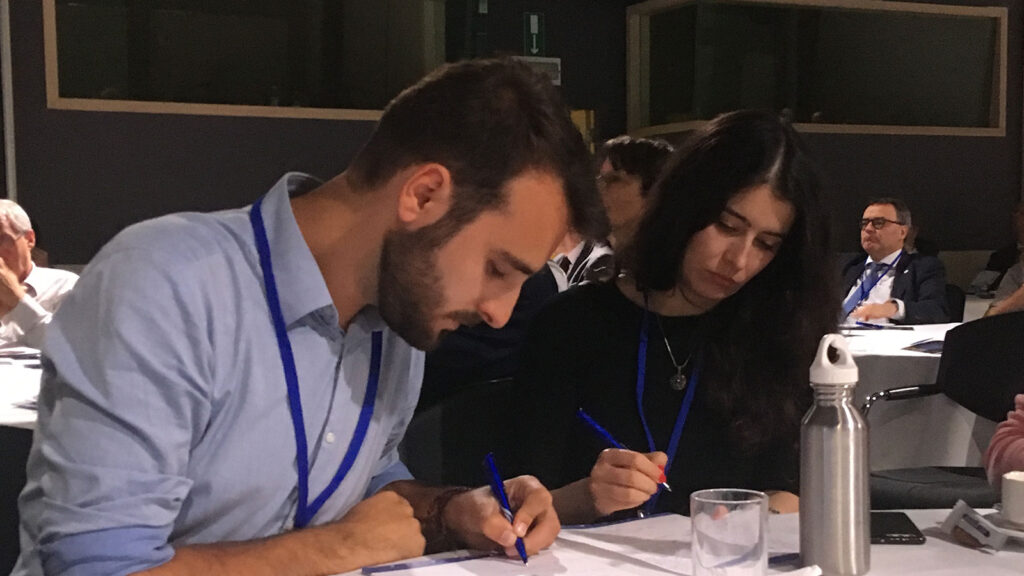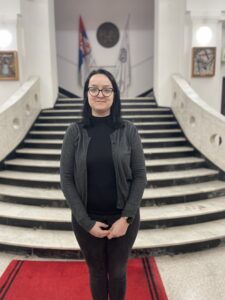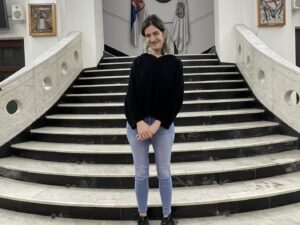Interview during of the journey with Loic Charpentier, Water Europe, Belgium
March 2021
Originally from France, near Bordeaux, I began my studies with a bachelors in law, and then on to Belgium for a master’s degree in international studies. For me, joining the water sector was unplanned, but it happened through an internship with the European association of Research and Technology Organisations – EARTO, which led to an opportunity in 2018 to join Water Europe (WE). Initiated in 2004 by the European Commission as a European Technology organization, Water Europe supports cross-European research and innovation in the water sector.
Today I’m working with Water Europe in Brussels on the full value chain of the water sector to build a European Water–Smart Society, based on 4 pillars: 1) value of water 2) value in water 3) grey & green infrastructures and 4) digital water. My role is to manage the advocacy program based on our vision and members’ information.
One current issue is that the water sector is fragmented, all the way down to the local levels. We need to build a more unified voice for all water stakeholders – in industries, agriculture, and communities – to have more water inclusion in policies and shared best practices. Ninety-five percent of business activities are based on having available water resources with the right quality. More focus is needed on this, because large portions of the EU either are suffering or will suffer from water scarcity.
Being in the EJWP is actually an opportunity in itself through the connections that we make, because we interact with other young experts in the water sector with different perspectives. For example, I work on regulatory issues, but I have experienced the technical aspect and learnt some useful points. It’s also something to see how the systems work in countries like Romania, Norway and others. Looking at the water footprint comparisons over regions has been particularly interesting. We’re all linked somehow in the water sector, but are completely different in our methods. Moreover, EJWP shows me other operational cultures. I feel that I’ve grown in my European professional capacities as a result of broader interaction in EJWP.
The EJWP programme has of course changed, as expected, during Covid conditions. A strong point of the program is to meet people and visit their work environment, so we’re finding new added value through a fully digital program. It’s complex, to be honest, but I feel I’m still experiencing the cultural exchange even though I’m looking forward to more human interaction when the pandemic subsides. We were at least fortunate to have two weeks together at the beginning, and this was good to secure smoother relationship during the projects.
I was in a leadership role in the first EJWP project linked to Water Europe. It was motivating to identify our way forward over a three–month period – and watch how the plan can take shape with various inputs to become something real. At first, I felt a sort of conflict with different ways of thinking on the way to determine a workable process. I was directly confronted with the importance of understanding other’s feelings and adapting my communication to maintain their participation. I realised for the first time the value of human relations in the success of projects. I think it was a success to start this 2–year programme and provide a first deliverable. Our collaboration resulted in a whitepaper to identify best practices for human capital in the water sector.
In EJWP, I feel like we’re building a cross-European network which will be valuable to contribute to the creation of a more unified European water sector. It fosters my job’s objectives, laying the foundations for more collaboration in research and development, also for the exchange of best practices to help in sustainable implementation. For example, when there’s a water issue somewhere, it’s likely happening in another area of Europe. It’s also an opportunity to exchange best practices and think about fresh ideas out of the box, because we as participants are not as limited by current demands and consequences of experimentation.
We need to have a Water-Smart Society. Even more than that, I can see personally how there would be benefits if the water sector did not actually exist. Water should be taken into account as a standard procedure in everything that we do: in manufacturing, agriculture, residential planning and so on. Everybody should strive for smart water management. Moreover, I can see how everyone can benefit from broader and more systematic collaboration at all levels of the public and private sectors.
I learned something in all of our projects, but I see that people often don’t speak the same professional language with terminology and work processes, so barriers can arise through non-communication. Furthermore, we need to align to raise the voice and influence of the water sector. Programs like EJWP are beneficial in bridging these types of communication gaps, because we can test ideas and communication in EJWP without fear of major consequential failures impacting our community.
Europe is facing numerous problems, but we don’t really see them for what they are. Climate initiatives are too often about mitigation – while this is important, we are facing problems of flooding, aging infrastructure, pollution, shortages of water – especially in urban areas (Cape Town for example). We are in many ways at the beginning of a water crisis for the coming decades, but it’s surprising that some people are still avoiding the issue because water management may not seem such a sexy topic. We need to motivate people and governments to act quickly in the best interest of people and water, otherwise, aspects of our civilization will fail as others have in history because of water crises.
More than tech, hybrid grey-green infrastructures help provide benefits generally integrating nature-based solutions while controlling risk. We can also apply some digital solutions in identifying problems that may not otherwise be detected, such as leakage, pollution, and water quality.
A young professional platform such as EJWP can connect better with a large diversity of water-related stakeholders and plant possibilities for more partnerships. EJWP really has some potential in building a community that can provide the kind of input we need in your daily work in the water-sector. It’s an investment for connecting in the future, more than financial, but in human capital, and this is important.
Introduction at start of the journey with Mathilde de Jongh, Policy advisor, Water Board Delfland, The Netherlands
June 2019
I started in the EU R&D policy and I stumbled on the water sector fortuitously. I discover a huge and complex topic which is paramount for people and our economies. The most interesting challenge is to contribute in the improvement of the international governance to avoid the “Colorado river effect” and to find innovative solutions to ensure a smart water management with citizens and local authorities.
I joined Water Europe in January 2018. I am in charge of membership and contributing to the policy and advocacy programmes (mainly HorizonEurope, Cohesion policy). I am graduated from the University of Brussels (ULB) in European Studies and also in Law from the University of Bordeaux.
For me, the EJWP is an opportunity to work on European projects and exchange knowledges and best practices to tackle climate change. For me, this challenge is the most important for my generation and we need to find innovative solutions, particularly for water-related issues. Therefore, I am eager to work with other young professionals to contribute to the development of those solutions and make Europe resilient to climate change.
Photo below: EJWP participants Loïc Charpentier and Ioana Dobrescu






